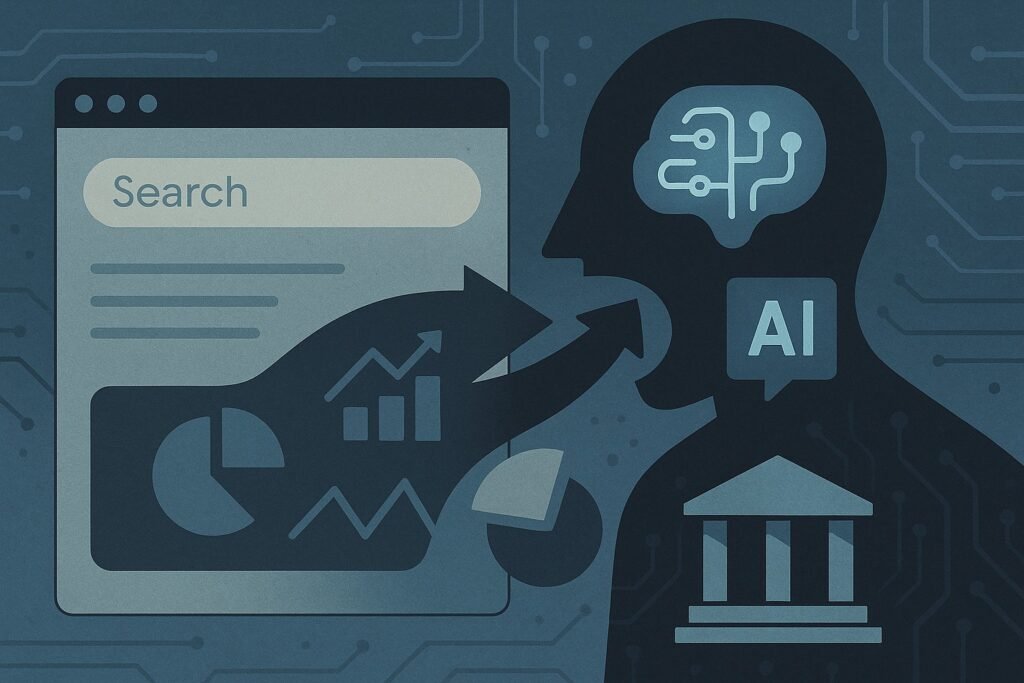

Digital marketing is undergoing one of its most dramatic transformations in decades. Artificial Intelligence (AI), especially conversational AI and generative technologies like ChatGPT, Google’s Bard, and similar platforms, is changing how people find and consume information online. This evolution is quietly but profoundly eating into traditional web traffic, leaving website owners scrambling for solutions.
Understanding precisely how AI cannibalizes web traffic and identifying strategies to counteract these effects is crucial. Below, we explore this phenomenon comprehensively, critically discussing its implications, and providing actionable insights.
How AI is Eating into Website Traffic
Historically, users seeking information typed queries into search engines and visited multiple websites to find satisfying answers. Today, AI-driven chatbots provide instant, comprehensive responses within their own interfaces, bypassing the traditional website visit entirely.
Imagine someone looking for a quick legal definition or the best way to treat a mild headache. Instead of sifting through multiple websites, AI platforms deliver straightforward answers immediately. This convenience significantly reduces the likelihood of users clicking through to original content sources.
The negative implications for informational websites, blogs, and news outlets are profound. These websites primarily monetize via ads and affiliate links—revenues directly tied to page visits. Lower traffic directly translates into reduced revenue, creating financial stress for content-focused sites.
The Real Impact on SEO and User Behavior
SEO strategies traditionally emphasized ranking high in search engine results pages (SERPs) and targeting Google’s featured snippets. These snippets previously drove substantial traffic to websites, as users sought more detailed information than the snippet could offer. However, with AI now capable of offering richer, more complete answers directly, clicks from featured snippets have plummeted.
Recent research highlights a dramatic shift: a considerable portion of informational queries now concludes entirely within AI tools, particularly impacting high-volume, straightforward questions. As AI tools continue to evolve, even nuanced queries increasingly receive comprehensive AI-driven answers.
Websites now need to create content that’s valuable enough to motivate additional clicks. This shift in content strategy emphasizes unique, in-depth, and authoritative content rather than general or superficial information.
In addressing these SEO challenges, outsourcing SEO has become increasingly attractive to website owners. Professional services tailored specifically for niche markets can significantly improve content strategy effectiveness, as detailed clearly in this post on why outsourcing SEO can be a game-changer.
Adapting Content Strategies
To combat AI-driven traffic loss, site owners must rethink their entire content approach. Producing large quantities of generic content no longer suffices. Instead, content must deliver unmatched depth, insight, and originality.
Critical discussion arises here: simply being thorough isn’t enough. Websites must present their content uniquely, offering perspectives AI-generated answers can’t easily replicate. Original case studies, expert interviews, detailed guides, or multimedia content significantly outperform standard informational pieces.
Moreover, content that invites interaction, such as interactive tools or calculators, draws users who seek personalized, dynamic experiences that static AI summaries can’t match. By prioritizing quality, uniqueness, and depth, websites can establish compelling reasons for users to engage directly, even when faced with convenient AI summaries.
Leveraging AI Instead of Competing

Savvy website owners are embracing AI technology themselves. Integrating AI-driven features, like chatbots, personalized content recommendations, and predictive analytics, enhances user experiences and helps retain visitors.
Critically, websites employing AI-powered personalization see increased user engagement and retention rates. Instead of allowing AI to solely erode web traffic, proactive site owners can repurpose AI as an ally to deepen relationships with visitors and effectively combat the challenges posed by zero-click searches.
Effective ways to leverage AI include:
– Personalized user experiences: Delivering tailored content suggestions based on user behavior.
– Real-time chatbots: Providing immediate, accurate responses to common user queries.
– Predictive analytics: Anticipating user needs and proactively offering solutions.
– Dynamic content optimization: Adjusting content presentation based on user engagement metrics to maximize relevance and interaction.
Implementing robust AI-driven personalization requires thoughtful technical investment but significantly boosts user loyalty, providing a vital hedge against external AI cannibalization.
Monetization Strategies in an AI-Dominated Environment
As AI reshapes user behavior, monetization strategies must evolve accordingly. Traditional reliance on ads and affiliate revenue is increasingly risky. Traffic fluctuations directly impact revenue stability, making diversification essential.
Subscription-based models, premium content offerings, or paid memberships can generate stable, recurring revenue. Critically assessing audience engagement and willingness to pay becomes vital. Websites offering genuinely irreplaceable insights—such as detailed reports, original data analyses, or expert tutorials—successfully convert casual visitors into paying subscribers.
Moreover, direct monetization methods like webinars, e-books, or industry-exclusive insights cater to audiences seeking more than AI’s generalized responses. Diversifying revenue streams mitigates the financial impact of declining ad revenues.
Enhanced Visibility Through Technical SEO and Structured Data
Technical SEO remains crucial in an AI-driven landscape. Structured data and schema markup significantly influence how AI indexes, interprets, and presents website content. Ensuring technical SEO accuracy maximizes visibility within AI-generated snippets and summaries.
Effective practices for technical SEO and structured data include:
– Schema markup: Clearly defining content context for better AI understanding.
– Internal linking: Strategically connecting relevant pages to guide AI indexing.
– Optimized load speeds: Ensuring rapid loading to maintain AI crawl efficiency.
– Mobile optimization: Guaranteeing excellent user experiences across mobile devices.
Critically, website owners must adapt to changing algorithms and AI indexing patterns proactively. Schema markup, for instance, clarifies content context, helping AI tools appropriately credit and reference original sources, indirectly boosting visibility and engagement.
The Future of AI and Website Traffic
AI-driven traffic erosion is not temporary; it represents a fundamental shift in digital information consumption. Website owners must critically evaluate their current strategies, prepare for sustained disruption, and adapt quickly to the evolving digital environment.
Several critical considerations include:
– Content originality: Websites must deliver irreplaceable, original content that AI cannot fully replicate.
– Technical excellence: Technical SEO optimization ensures content remains prominently featured in AI platforms.
– Diversified revenue streams: Relying solely on traditional traffic-driven monetization is increasingly precarious.
– Strategic AI integration: Using AI within your platform significantly improves user engagement and retention.
AI‘s transformative impact on web traffic is a current reality demanding immediate action. Understanding the depth and permanence of AI’s role in online user behavior empowers website owners to make informed, strategic decisions.
Robust quality content, innovative monetization strategies, technical optimization, and proactive AI integration position websites to thrive even amid profound shifts. Those who critically adapt now stand to gain significant advantages in the evolving digital landscape, turning AI from a disruptive force into a strategic partner.
The post How AI Is Cannibalizing Website Traffic: What Site Owners Need to Know appeared first on Android Headlines.


